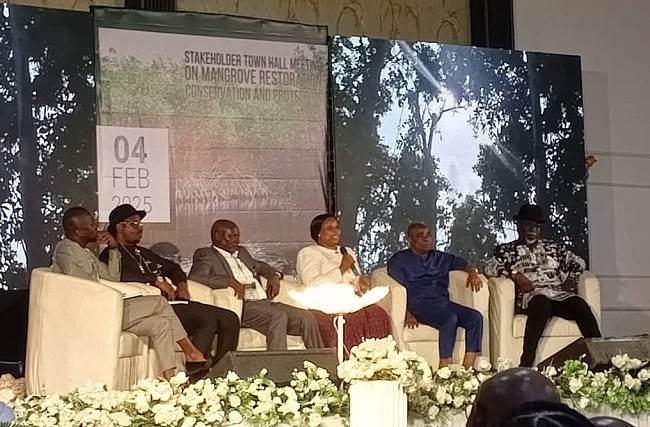The National Council on Climate Change Secretariat (NCCCS) and environmental stakeholders in the Niger Delta Region have brainstormed on steps towards ensuring sustainable mangrove conservation and protection in Nigeria.

The hybrid stakeholders’ session on Mangrove Restoration, Conservation and Protection with the theme “Amplifying Nature-Based Climate Solutions” was held on Tuesday, February 4, 2025, in Calabar, the Cross River State Capital, in collaboration with the Nigeria Conservation Foundation (NCF) and the Climate Change Council, Cross Rivers State.
Participants highlighted the need of safeguarding the Nigeria mangrove forest that is occupying 10,500-kilometre square, which is already threatened by illegal man-made activities particularly in the Niger Delta Region.
Earlier in her opening remarks, Director General /CEO OF NCCCS who is also the Special Presidential Envoy on Climate Change (SPEC), Dr. Nkiruka Maduekwe, said the Nigeria’s mangrove forest is indicated as the largest in Africa and third largest in the world, covering approximately 5% of the global mangrove forest.
Acknowledging the vital role that the coastal ecosystem is playing by combating climate and safeguarding communities from its effects, the NCCCS boss said the secretariat is developing a roadmap for the restoration of Nigeria’s essential mangrove forest, a robust initiative targeted to span 2025 to 2035.
According to her, the Town Hall Meeting would provide a crucial platform for all relevant stakeholders to discuss the next steps in ensuring sustainable mangrove conservation and protection in Nigeria.
“As part of the World Wetlands Day and further to the 2025 theme of Amplifying Nature-Based Climate Solutions, the NCCCS is convening this Stakeholder Town Hall Meeting in collaboration with the Nigeria Conservation Foundation and the Climate Change Council of Cross Rivers State.
“A key output from this meeting is the National Roadmap on Mangrove Restoration, Conservation, and Protection. This Roadmap is expected to align with the ongoing NDC 3.0 review and indicates clear avenues to drive finance for mangrove conservation and protection in Nigeria.”
While acknowledging the presence of attending commissioners, she emphasised the crucial role of sub-national governments in implementing policies and ensuring effective on-ground interventions through their commitments.
“In line with President Bola Tinubu’s Renewed Hope Agenda, the National Council on Climate Change Secretariat, of which Mr. President is the Chairman of the Council, will continue to play its role as a coordinating and regulatory entity, ensuring that policies and financial mechanisms support long-term sustainability.
“Furthermore, this meeting should serve as a catalyst for mangrove-rich states to establish investment-grade forest carbon projects. As we deliberate, let us carefully consider the essential building blocks of forest finance,” Maduekwe noted.
She further commended the efforts of Cross River State in adopting the Climate Change Act, adding that the legislative framework positions the state to harness climate finance opportunities geared towards adaptation and ecosystem-hand solutions.
Expressing their commitment in the fight against climate change and the readiness to restore the lost ecosystem, the Cross River State Governor, Senator Bassey Otu, said for decades, the state has led in environmental conservation with over 53,000 hectares of degraded mangroves primed for restoration.
Otu, who was represented by the Commissioner for Special Duties and Intergovernmental Affairs, disclosed that the state is actively engaging investors and development partners to capitalise on carbon emission opportunities, a significant milestone that was reached at the COP28 with the national department of climate change.
He called for a critical framework to unlock Nigeria’s carbon economy potential, saying: “We urge the revitalisation of the carbon market framework to ensure stability and restore confidence in the sector.”
In a resolution made during the town hall meeting by the attending Commissioners of Environment from Abia, Bayelsa, Cross River, Delta and Rivers states, participants worried that series of workshops and meetings held have failed to deliver a National Carbon Framework and Registry despite repeated commitments over the past five years.
The resolution, which was read by the Chairman of Commissioners of Environment, Mr. Moses Osoji, who is the Cross River State Commissioner for Environment, called for the speedy implementation of the National Carbon Framework within three months.
He also urged the federal government authorise the development of the National Carbon Registry within the six months, leveraging on the regions and international partners expertise.
By Stina Ezin, Calabar
